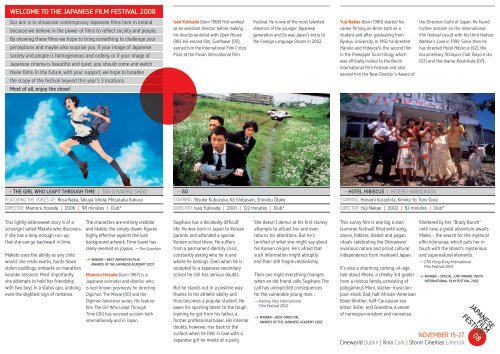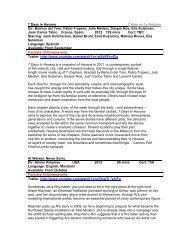Japanese Film Festival 2008 Brochure - Access Cinema
Japanese Film Festival 2008 Brochure - Access Cinema
Japanese Film Festival 2008 Brochure - Access Cinema
You also want an ePaper? Increase the reach of your titles
YUMPU automatically turns print PDFs into web optimized ePapers that Google loves.
WELCOME TO THE JAPANESE FILM FESTIVAL <strong>2008</strong><br />
Our aim is to showcase contemporary <strong>Japanese</strong> films here in Ireland<br />
because we believe in the power of films to reflect society and people.<br />
By showing these films we hope to bring something to challenge your<br />
perceptions and maybe also surprise you. If your image of <strong>Japanese</strong><br />
society and people is homogeneous and orderly, or if your image of<br />
<strong>Japanese</strong> cinema is beautiful and quiet, you should come and watch<br />
these films. In the future, with your support, we hope to broaden<br />
the scope of the festival beyond this year’s 3 locations.<br />
Most of all, enjoy the show!<br />
Isao Yukisada (born 1968) first worked<br />
as an assistant director before making<br />
his directorial debut with Open House<br />
(98). His second film, Sunflower (00),<br />
earned him the International <strong>Film</strong> Critics’<br />
Prize at the Pusan International <strong>Film</strong><br />
<strong>Festival</strong>. He is one of the most talented<br />
directors of the younger <strong>Japanese</strong><br />
generation and Go was Japan’s entry to<br />
the Foreign Language Oscars in 2002.<br />
Yuji Nakae (born 1960) started his<br />
career filming on 8mm both as a<br />
student and after graduating from<br />
Ryukyu University. In 1992 he directed<br />
Haruko and Hideyoshi, the second film<br />
in the Pineapple Tours trilogy, which<br />
was officially invited to the Berlin<br />
International <strong>Film</strong> <strong>Festival</strong> and also<br />
earned him the New Director’s Award of<br />
the Directors Guild of Japan. He found<br />
further acclaim on the international<br />
film festival circuit with his third feature<br />
Nabbie’s Love in 1999. Since then he<br />
has directed Hotel Hibiscus (02), the<br />
documentary Shirayuri Club Tokyo e iku<br />
(03) and the drama Koishikute (07).<br />
• THE GIRL WHO LEAPT THROUGH TIME | TOKI O KAKERU SHŌJO<br />
FEATURING THE VOICES OF: Riisa Naka, Takuya Ishida, Mitsutaka Itakura<br />
DIRECTOR: Mamoru Hosoda | 2006 | 98 minutes | Club*<br />
• GO<br />
STARRING: Yōsuke Kubozuka, Kō Shibasaki, Shinobu Ōtake<br />
DIRECTOR: Isao Yukisada | 2001 | 122 minutes | Club*<br />
• HOTEL HIBISCUS | HOTERU HAIBISUKASU<br />
STARRING: Honami Kurashita, Kimiko Yo, Tomi Taira<br />
DIRECTOR: Yuji Nakae | 2002 | 92 minutes | Club*<br />
This lightly bittersweet story is of a<br />
schoolgirl called Makoto who discovers,<br />
if she has a long-enough run-up,<br />
that she can go backward in time.<br />
Makoto uses the ability as any child<br />
would: she resits exams, hunts down<br />
stolen puddings, embarks on marathon<br />
karaoke sessions. Most importantly,<br />
she attempts to hold her friendship<br />
with two boys in a status quo, undoing<br />
even the slightest sign of romance.<br />
The characters are entirely credible<br />
and likable, the simply drawn figures<br />
highly effective against the lush<br />
background artwork. Time travel has<br />
rarely seemed so joyous. —The Guardian<br />
→ WINNER – BEST ANIMATION FILM,<br />
AWARDS OF THE JAPANESE ACADEMY 2007<br />
Mamoru Hosoda (born 1967) is a<br />
<strong>Japanese</strong> animator and director who<br />
is best known previously for directing<br />
Digimon: The Movie (00) and the<br />
Digimon television series. His feature<br />
film The Girl Who Leapt Through<br />
Time (06) has received acclaim both<br />
internationally and in Japan.<br />
Sugihara has a decidedly difficult<br />
life. He was born in Japan to Korean<br />
parents and attended a special<br />
Korean school there. He suffers<br />
from a permanent identity crisis,<br />
constantly asking who he is and<br />
where he belongs. Even when he is<br />
accepted to a <strong>Japanese</strong> secondary<br />
school he still has serious doubts.<br />
But he stands out in a positive way<br />
thanks to his athletic ability and<br />
thus becomes a popular student. He<br />
owes his sporting talent to the tough<br />
training he got from his father, a<br />
former professional boxer. His internal<br />
doubts, however, rise back to the<br />
surface when he falls in love with a<br />
<strong>Japanese</strong> girl he meets at a party.<br />
She doesn’t demur at his first clumsy<br />
attempts to attract her and even<br />
returns his attentions. But he’s<br />
terrified of what she might say about<br />
his Korean origins. He’s afraid that<br />
such information might abruptly<br />
end their still fragile relationship.<br />
Then one night everything changes<br />
when an old friend calls Sugihara. The<br />
call has unexpected consequences<br />
for the vulnerable young man…<br />
—Karlovy Vary International<br />
<strong>Film</strong> <strong>Festival</strong> 2002<br />
→ WINNER – BEST DIRECTOR,<br />
AWARDS OF THE JAPANESE ACADEMY 2002<br />
This sunny film is one big o-bon<br />
(summer festival) filled with song,<br />
dance, folklore, dialect and pagan<br />
rituals celebrating the Okinawans’<br />
vivacious nature and proud cultural<br />
independence from mainland Japan.<br />
It’s also a charming coming-of-age<br />
tale about Mieko, a cheeky 3rd grader<br />
from a riotous family, consisting of<br />
polygamous Mom, slacker-musicianpool-shark<br />
Dad, half African-American<br />
boxer Brother, half-Caucasian sex<br />
kitten Sister, and Grandma, a vessel<br />
of homespun wisdom and nonsense.<br />
Sheltered by her “Brady Bunch”<br />
until now, a great adventure awaits<br />
Mieko - the search for the mythical<br />
elfin kijimunaa, which puts her in<br />
touch with the Island’s mysterious<br />
and supernatural elements.<br />
—27th Hong Kong International<br />
<strong>Film</strong> <strong>Festival</strong> 2003<br />
→ WINNER – SPECIAL JURY AWARD, TOKYO<br />
INTERNATIONAL FILM FESTIVAL 2002<br />
NOVEMBER 15-27<br />
Cineworld Dublin | Kino Cork | Storm <strong>Cinema</strong>s Limerick




